Nestled in southwestern Turkey, Pamukkale, known as the Cotton Castle, beckons travelers with its ethereal beauty, resembling a landscape cloaked in a blanket of fluffy cotton. This captivating natural wonder boasts white terraces sculpted by the cascading mineral-rich thermal waters, a sight that mesmerizes all who lay eyes upon it.
But the magic doesn’t end there; Pamukkale also holds within its embrace the ancient Roman city of Hierapolis, a treasure trove of archaeological wonders. As the reader embarks on a journey through the enchanting realm of Pamukkale, they will discover a world of captivating history, awe-inspiring landscapes, and unforgettable experiences waiting to be unveiled.
- Good To Know
- Historical Background
- Geographical Features
- Unique Traveller Experiences
- Cultural Significance
- How to Get There
- Tips for a Memorable Visit
- Common Questions
- What Is the Best Time of Year to Visit Pamukkale?
- Are There Any Age Restrictions for Visiting Pamukkale?
- Are There Any Nearby Accommodations or Hotels?
- Is It Possible to Swim in the Travertine Terraces?
- Are There Any Guided Tours Available at Pamukkale?
- The Sum Up
- More Tour Reviews in Izmir
- Looking for something different? Other Izmir activities we've written about
Good To Know

- Pamukkale has a rich historical background, dating back to the 8th century BC, and was once a thriving Roman spa town attracting visitors from all over.
- The preservation of cultural heritage is highly valued in Pamukkale, with the local community actively participating in preserving and promoting their traditions.
- The unique geographical features of Pamukkale, with its terraces made of travertine and mineral-rich hot springs, create a mesmerizing sight and have earned it the nickname ‘The Cotton Castle’.
- Travelers to Pamukkale can have a memorable experience by soaking in the thermal pools, exploring the well-preserved ruins of Hierapolis, immersing in the local culture, and enjoying the relaxation, history, and culture the destination offers.
Historical Background
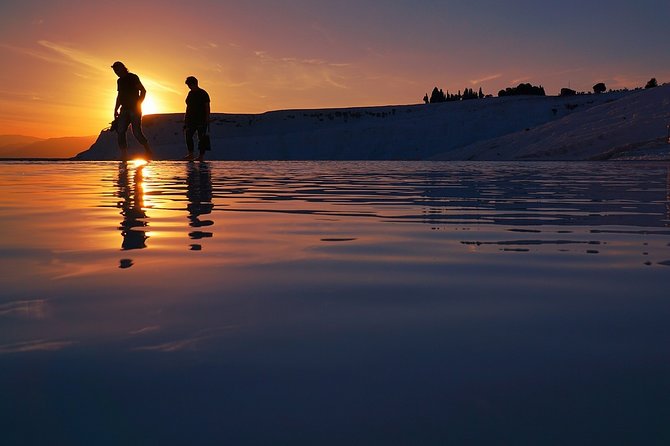
Pamukkale, also known as the Cotton Castle, holds a rich historical background that will transport you back in time. This stunning natural wonder in Turkey hasn’t only captivated visitors with its unique terraces of white mineral-rich water, but it also holds great archaeological significance.
The site has been inhabited since ancient times, with evidence of settlements dating back to the 8th century BC. The ancient city of Hierapolis, located on top of the Pamukkale terraces, was once a thriving Roman spa town. Its thermal waters were believed to have healing properties, attracting people from far and wide.
Today, visitors can explore the ruins of this ancient city, including the well-preserved theater, necropolis, and Roman baths, gaining a glimpse into the history and grandeur of the past. The historical background of Pamukkale is a testament to its enduring allure and importance in the ancient world.
Find more activities and experiences we've covered in Izmir.
Geographical Features
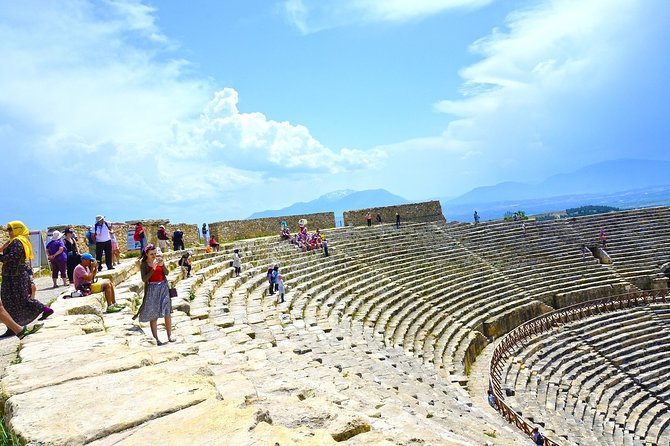
As visitors explore the historical background of Pamukkale, they’ll soon be captivated by its unique geographical features. One of the most impressive aspects of this destination is its geological formation, which has earned it the nickname ‘The Cotton Castle.’
Pamukkale is home to a series of terraces made of travertine, a type of limestone deposited by mineral-rich hot springs. These terraces create stunning natural wonders, with their brilliant white color and cascading pools of turquoise water.
The formation of these terraces has been a result of thousands of years of mineral-rich water flowing down the hillside and leaving behind deposits. The combination of the white terraces and the vibrant blue water makes Pamukkale a truly mesmerizing sight to behold.
Unique Traveller Experiences
Visitors to Pamukkale can embark on unforgettable adventures that offer a unique glimpse into the natural wonders of this extraordinary destination. Here are three unique traveller experiences that showcase the beauty and charm of Pamukkale:
Soaking in the Thermal Pools: Pamukkale’s thermal pools aren’t only visually stunning but also known for their healing properties. Travellers can take a dip in the warm, mineral-rich waters while enjoying panoramic views of the terraces. It’s a rejuvenating experience that will leave you feeling refreshed and invigorated.
Exploring Hierapolis: The ancient city of Hierapolis is located atop Pamukkale and offers a fascinating glimpse into the past. Travellers can wander through the well-preserved ruins, including a theatre, necropolis, and the famous Cleopatra’s Pool. It’s a chance to step back in time and learn about the rich history of the region.
Taking in Local Customs: Pamukkale isn’t just about its natural wonders; it’s also about the warm hospitality and unique customs of the local people. Travellers can enjoy the local culture by trying traditional Turkish cuisine, participating in local festivals, and interacting with the friendly residents. It’s an opportunity to gain a deeper understanding of the region and its people.
These unique traveller experiences are just a glimpse of what Pamukkale has to offer. Whether you’re seeking relaxation, history, or culture, this destination has it all.
Cultural Significance
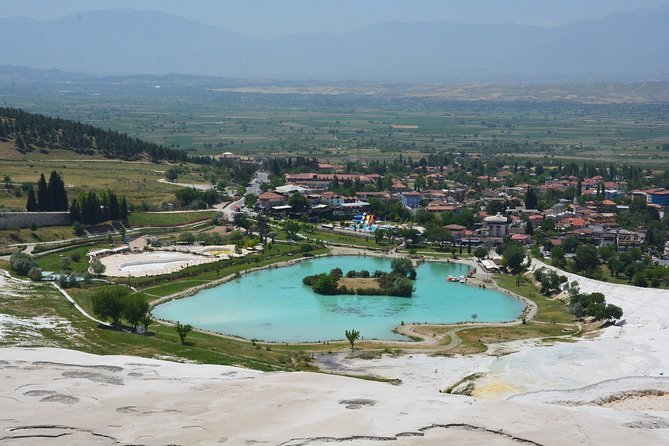
With its rich history and vibrant traditions, Pamukkale holds a cultural significance that captivates visitors from around the world. The preservation of cultural heritage is highly valued in Pamukkale, with efforts made to protect and showcase the unique traditions of the region. Local traditions such as traditional Turkish baths and the art of carpet weaving are celebrated and passed down through generations. Pamukkale also offers a glimpse into the ancient Roman city of Hierapolis, where visitors can explore the ruins of grand temples and theaters. The cultural significance of Pamukkale extends beyond its historical sites, as the local community actively participates in preserving and promoting their traditions. From colorful festivals to traditional music and dance performances, Pamukkale offers a truly immersive cultural experience for all who visit.
| Cultural Significance | |
|---|---|
| Cultural preservation | Local traditions |
How to Get There
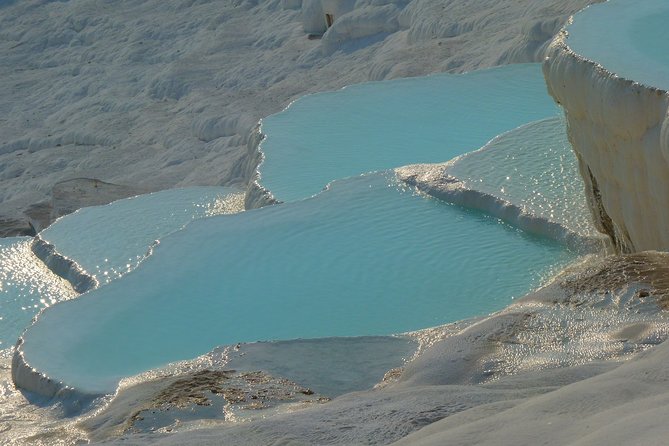
To reach the enchanting destination of Pamukkale, travelers can embark on a memorable journey that takes them through picturesque landscapes and ancient wonders. Here are some transportation options and nearby attractions to consider:
1) Transportation options:
- By plane: The nearest airport is Denizli Cardak Airport, which is about 65 kilometers away from Pamukkale. From the airport, travelers can take a taxi or a shuttle bus to reach their destination.
- By bus: There are regular bus services from major cities in Turkey to Pamukkale. Travelers can enjoy the scenic route and have the convenience of multiple departure times.
- By car: Pamukkale is easily accessible by car, with well-maintained roads leading to the destination. Rental cars are available at the airport and in nearby cities.
2) Nearby attractions:
- Hierapolis: Explore the ancient city of Hierapolis, known for its well-preserved ruins, theater, and the famous Cleopatra’s Pool.
- Aphrodisias: Visit the archaeological site of Aphrodisias, home to the Temple of Aphrodite and a fascinating museum displaying ancient artifacts.
- Laodicea: Discover the ancient city of Laodicea, with its well-preserved stadium, theater, and magnificent columns.
With these transportation options and nearby attractions, travelers can make the most of their visit to Pamukkale and create unforgettable memories.
Tips for a Memorable Visit
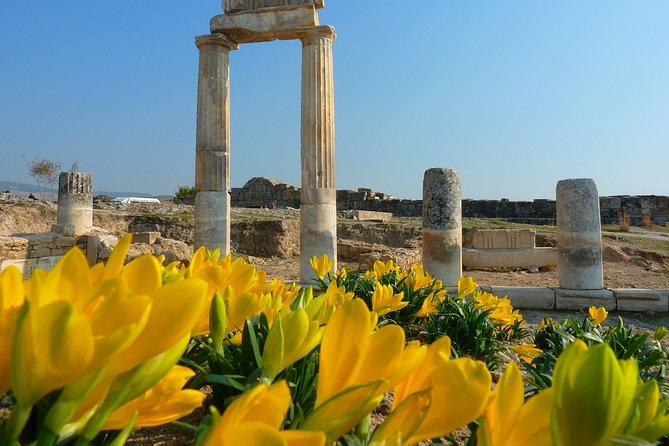
For an unforgettable experience at Pamukkale, travelers can enhance their visit with these essential tips.
According to traveler recommendations, the best time to visit Pamukkale is during the spring or autumn months when the weather is pleasant and the crowds are smaller. This allows visitors to fully appreciate the beauty of the cotton-like terraces without feeling overwhelmed.
It’s also advisable to arrive early in the morning to avoid the heat and to have a more peaceful experience. Another tip is to wear comfortable shoes as the terraces can be slippery.
Bringing a camera is a must, as the stunning views and unique landscapes are perfect for capturing memorable moments.
Lastly, it’s important to respect the rules and regulations of the site to preserve its natural beauty for future visitors.
Common Questions
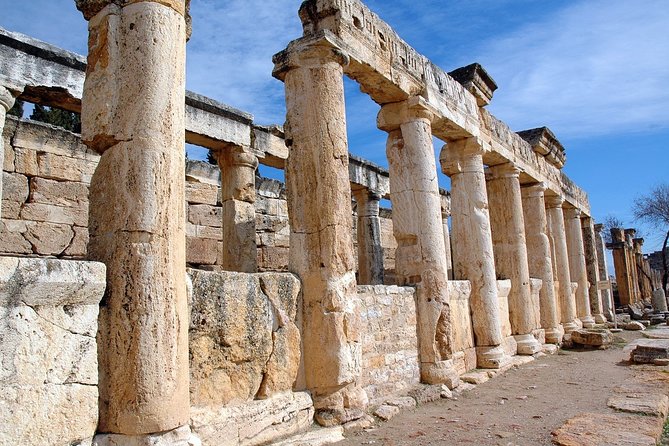
What Is the Best Time of Year to Visit Pamukkale?
The best time of year to visit Pamukkale is during the spring or autumn when the weather is pleasant and the crowds are smaller. You’ll have the opportunity to capture stunning photography spots and enjoy activities for kids.
Are There Any Age Restrictions for Visiting Pamukkale?
There are no age restrictions for visiting Pamukkale. It is a destination that can be enjoyed by people of all ages. The best time to visit Pamukkale is during the spring or autumn months.
Are There Any Nearby Accommodations or Hotels?
There are several nearby accommodations and hotels in the area. Travelers can choose from a range of options to suit their needs and preferences, ensuring a comfortable stay during their visit.
Is It Possible to Swim in the Travertine Terraces?
Yes, visitors can swim in the travertine terraces at Pamukkale. The experience offers a unique opportunity to soak in the warm, mineral-rich waters while surrounded by the stunning natural beauty of the cotton-like cascades.
Are There Any Guided Tours Available at Pamukkale?
Yes, there are guided tours available at Pamukkale. These tours offer a great way to explore the stunning attractions of Pamukkale, providing informative guides and an immersive experience for visitors.
The Sum Up
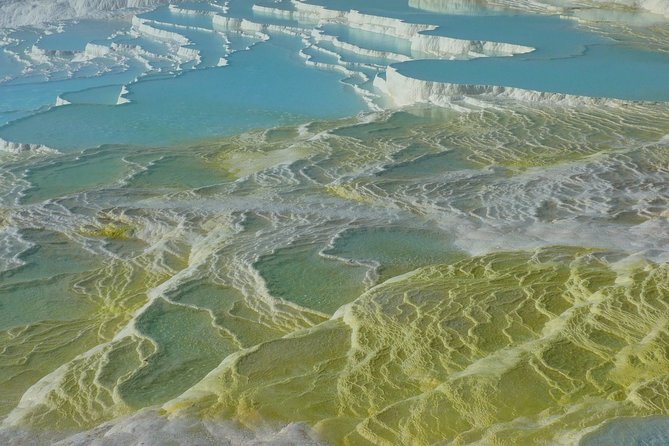
To sum it up, a visit to Pamukkale, also known as the Cotton Castle, promises an unforgettable experience of natural beauty and cultural significance.
From the mesmerizing terraced pools formed by mineral-rich thermal waters to the well-preserved ruins of the ancient Roman city of Hierapolis, this destination offers a unique blend of relaxation and historical exploration.
So, whether you’re seeking healing in the thermal waters or enjoying ancient history, Pamukkale is sure to leave you awe-inspired.
More Tour Reviews in Izmir
- Izmir to Aphrodisias: Cooking & Ceramics Class
- Seven Churches of Revelation Tour
- Customized Ephesus Private Tour / FOR CRUISE GUESTS ONLY
- Private Ephesus & House of Virgin Mary, Izmir Port /cruisers only
- Ephesus Highlights Tour: Exclusive for Cruise Guests
- Independent Pamukkale Tour From Izmir With Hot Air Balloon Flight
Looking for something different? Other Izmir activities we've written about
- Izmir to Aphrodisias: Cooking & Ceramics Class
- Seven Churches of Revelation Tour
- Customized Ephesus Private Tour / FOR CRUISE GUESTS ONLY
- Private Ephesus & House of Virgin Mary, Izmir Port /cruisers only
- Ephesus Highlights Tour: Exclusive for Cruise Guests
- Independent Pamukkale Tour From Izmir With Hot Air Balloon Flight
- Ephesus Tour From Izmir (Best Seller)
- Ephesus Ancient City with Best Guides Only For Cruise Guests
- From Izmir: Ephesus Ancient City Day Tour w/Lunch
- From zmir Port : zmir City Tour – Colors of Izmir
- From Izmir: Pamukkale, Hierapolis and Karahayit Day Tour
- Ephesus Port: Private Guided Customizable Tour
